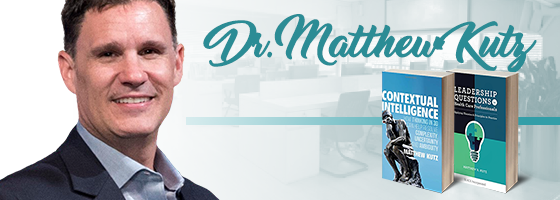It’s time to deconstruct then reconstruct how we think about leadership! Almost everything we learn about leadership is industry-specific. In fact, most of the time leadership, at least the way we envision it, requires a stable and predictable world for it to work. News flash, the world, and business is anything but stable and predictable. Ironically, the word has always been irreducibly complex, uncertain, turbulent, and irreverent. It’s just that there is rarely a force disruptive enough to demonstrate that on a global scale – until now (referring to the COVID-19 pandemic). The best response is to be proactive by reconsidering our overall philosophy of leadership. We must go back to the proverbial “drawing board” and assess our governing assumptions (i.e., ask new questions) about leadership. I am convinced that those who refuse to challenge their governing assumptions about leadership will become irrelevant. Taking a detailed inventory of our leadership-based values, beliefs, models, and concepts is a must. So, I offer the following insights to help us rethink leadership.
1. CONTEXT MATTERS
The correct leadership intervention is dictated almost exclusively by the context, NOT the follower’s needs or ability. Learn to discern context and how people impact the context.
2. LEADERSHIP IS FLUID
Leadership models that worked in stable and predictable contexts DO NOT work in a chaotic one. Leadership models that were instigated when the world was different are no longer relevant.
3. CHAOS IS OPPORTUNITY KNOCKING
Leadership thinking must make room for chaos as a valuable source of potential, and not something to be avoided or solved.
4. LEADERSHIP TRANSCENDS WORK
Leadership is a way of life, not a skill to be used in attaining mutual goals or inspiring followers. To relegate leadership development to organizational needs alone is short-sighted and dangerous.
5. STOP MANAGING
Traditional management techniques are simply inadequate and irrelevant.
6. MAKE YOURSELF THINK IN 3D
Three-dimensional (3D) thinking simultaneously integrates hindsight, insight, and foresight into decision-making to offer a more complete picture of the landscape. (for more on 3D Thinking and this cutting-edge research visit www.matthewkutz.com)
7. OLD DOGS NEED NEW TRICKS
No historically proven cluster of leadership skills works well every time or in all situations. Relying on what worked well before in “situations like these” will fail.
By using these 7 “thoughtful prods” to help us rethink leadership we will be in a much better position to successfully navigate a chaotic and hostile world. To create and sustain organizations that contribute to meaning in a post-COVID-19 world we must insist on regularly recalibrating our leadership assumptions and models.
ABOUT DR. MATTHEW KUTZ
Matt Kutz, Ph.D. is a Fulbright Scholar in the Medical Sciences and a Visiting Research Scholar in the College of Medicine at Griffith University and Gold Coast University Hospital. Dr. Kutz holds a Ph.D. in Global Leadership and is an award-winning author, international scholar, and editor of two academic journals. Dr. Kutz’s book on Contextual Intelligence was a Leadership Book Award honoree for Innovation and Cutting-Edge Perspective. He has written multiple other books and textbooks on leadership and management. Matt is a certified and licensed Athletic Trainer and Strength and Conditioning Specialist and has worked with elite athletes and Olympic committees around the world as well as Team USA (Track & Field).

1 Comment